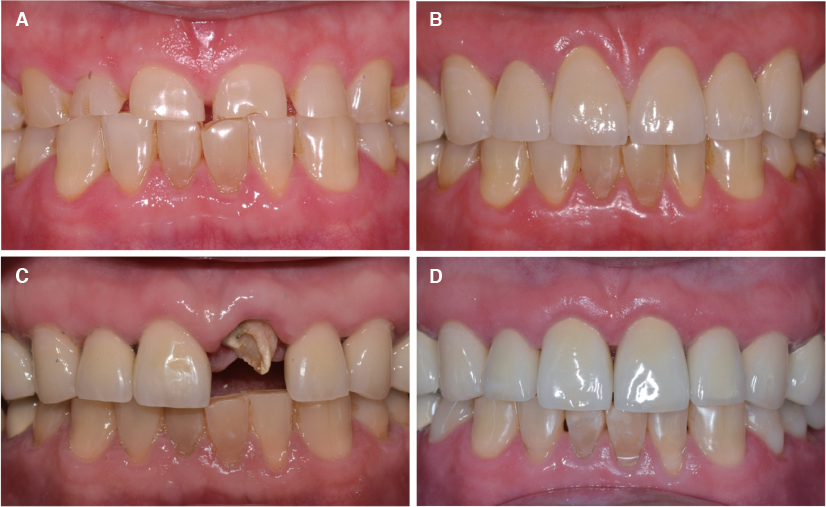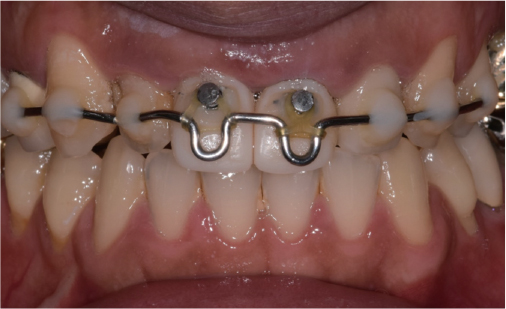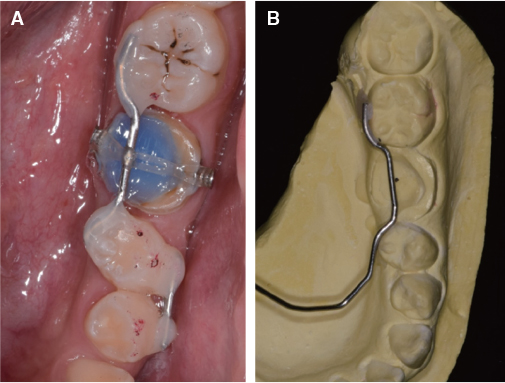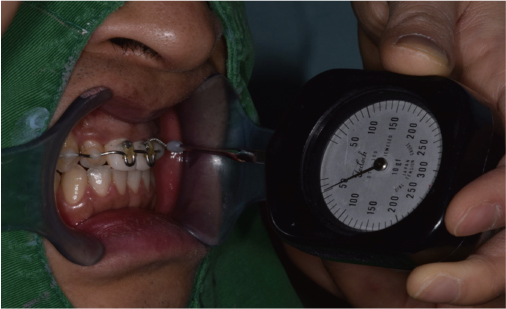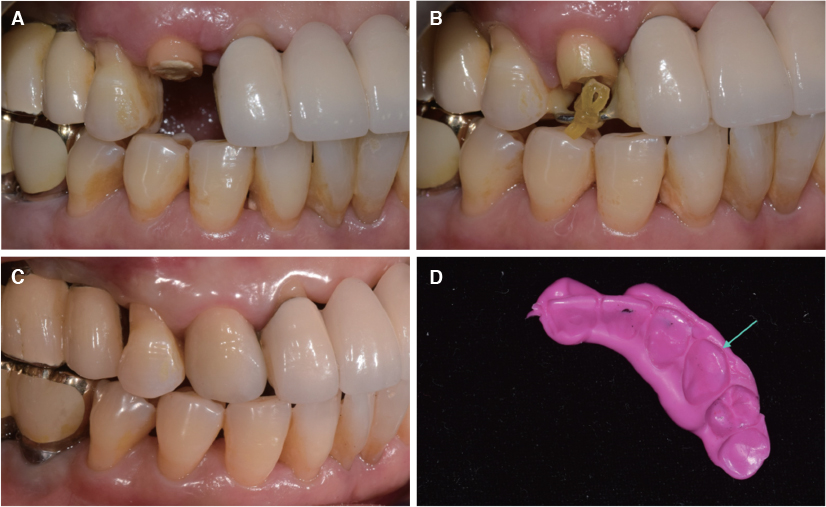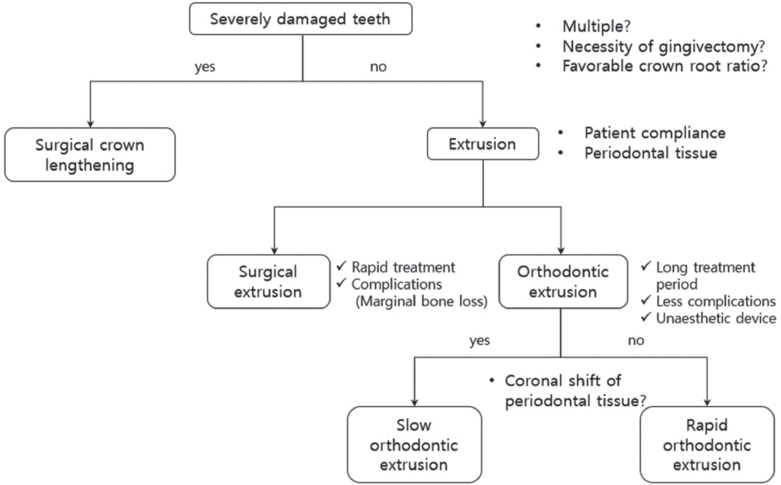J Korean Acad Prosthodont.
2018 Apr;56(2):134-140. 10.4047/jkap.2018.56.2.134.
Considerations in the selection of method for clinical crown lengthening
- Affiliations
-
- 1Department of Prosthodontics and Research Institute of Oral Science, College of Dentistry, Gangneung-Wonju National University, Gangneung, Republic of Korea. doctorcj@gwnu.ac.kr
- KMID: 2410117
- DOI: http://doi.org/10.4047/jkap.2018.56.2.134
Abstract
- Clinical crown lengthening procedure would be an effective method for overcoming adverse clinical condition such as short abutment length. There are three kinds of methods in clinical crown lengthening, those are, surgical crown lengthening, orthodontic extrusion and surgical extrusion. Clinicians have to try their best to choose a proper method among those for favorable results. This report aims to review the considerations in each method with various cases and to suggest a decision flow for appropriate selection.
Keyword
Figure
Reference
-
1. Assif D, Bitenski A, Pilo R, Oren E. Effect of post design on resistance to fracture of endodontically treated teeth with complete crowns. J Prosthet Dent. 1993; 69:36–40.
Article2. Gegauff AG. Effect of crown lengthening and ferrule placement on static load failure of cemented cast post-cores and crowns. J Prosthet Dent. 2000; 84:169–179.
Article3. Rosentiel SF, Land MF, Fujimoto J. Contemporary fixed prosthodontics. 4th ed. Seoul: DaehanNarae publishing, Inc;2008. p. 341–342.4. Andreasen JO, Andreasen FM, Andersson L. Textbook and color atlas of traumatic injuries to the teeth. 4th ed. Seoul: DaehanNarae publishing, Inc;2008. p. 324–329.5. Stevens BH, Levine RA. Forced eruption: a multidisciplinary approach for form, function, and biologic predictability. Compend Contin Educ Dent. 1998; 19:994–998. 10001002-4 passim.6. Tal H, Diaz ML. Crown lengthening procedures: an overview. Refuat Hashinayim. 1985; 3:3–7.7. Brägger U, Lauchenauer D, Lang NP. Surgical lengthening of the clinical crown. J Clin Periodontol. 1992; 19:58–63.
Article8. Alsahhaf A, Att W. Orthodontic extrusion for pre-implant site enhancement: Principles and clinical guidelines. J Prosthodont Res. 2016; 60:145–155.
Article9. Pontoriero R, Celenza F Jr, Ricci G, Carnevale G. Rapid extrusion with fiber resection: a combined orthodonticperiodontic treatment modality. Int J Periodontics Restorative Dent. 1987; 7:30–43.10. Wehr C, Roth A, Gustav M, Diedrich P. Forced eruption for preservation of a deeply fractured molar. J Orofac Orthop. 2004; 65:343–354.
Article11. Derton N, Derton R, Perini A. Forced eruption with miniscrews; inter-arch [corrected] method with vertical elastics versus intra-arch method using the Derton-Perini technique: two case reports. Int Orthod. 2011; 9:179–195.
Article12. Cesar-Neto JB, Martos J, Artifon L, Silveira LF, Michelon D, Masotti AS, Silva JC. Mandibular molar rehabilitation using orthodontic extrusion associated with odontoplasty. J Prosthodont. 2012; 21:626–630.
Article13. Geron S, Ziskind D. Lingual forced eruption orthodontic technique: clinical considerations for patient selection and clinical report. J Prosthet Dent. 2002; 87:125–128.
Article14. Ziskind D, Sharon E, Hirschfeld Z, Becker A. Analysis of lateral tooth movement during forced orthodontic eruption. J Prosthet Dent. 2000; 84:462–466.
Article15. Emerich-Poplatek K, Sawicki L, Bodal M, Adamowicz-Klepalska B. Forced eruption after crown/root fracture with a simple and aesthetic method using the fractured crown. Dent Traumatol. 2005; 21:165–169.
Article16. Yüzügüllü B, Polat O, Ungör M. Multidisciplinary approach to traumatized teeth: a case report. Dent Traumatol. 2008; 24:e27–e30.
Article17. Brindis MA, Block MS. Orthodontic tooth extrusion to enhance soft tissue implant esthetics. J Oral Maxillofac Surg. 2009; 67:49–59.
Article18. Korayem M, Flores-Mir C, Nassar U, Olfert K. Implant site development by orthodontic extrusion. A systematic review. Angle Orthod. 2008; 78:752–760.19. Lemon RR. Simplified esthetic root extrusion techniques. Oral Surg Oral Med Oral Pathol. 1982; 54:93–99.
Article20. Simon JH, Lythgoe JB, Torabinejad M. Clinical and histologic evaluation of extruded endodontically treated teeth in dogs. Oral Surg Oral Med Oral Pathol. 1980; 50:361–371.
Article21. Nozawa T, Sugiyama T, Yamaguchi S, Ramos T, Komatsu S, Enomoto H, Ito K. Buccal and coronal bone augmentation using forced eruption and buccal root torque: a case report. Int J Periodontics Restorative Dent. 2003; 23:585–591.22. Elkhadem A, Mickan S, Richards D. Adverse events of surgical extrusion in treatment for crown-root and cervical root fractures: a systematic review of case series/reports. Dent Traumatol. 2014; 30:1–14.
Article23. Berude JA, Hicks ML, Sauber JJ, Li SH. Resorption after physiological and rigid splinting of replanted permanent incisors in monkeys. J Endod. 1988; 14:592–600.
Article24. Lee JH, Yoon SM. Surgical extrusion of multiple teeth with crown-root fractures: a case report with 18-months follow up. Dent Traumatol. 2015; 31:150–155.
Article
- Full Text Links
- Actions
-
Cited
- CITED
-
- Close
- Share
- Similar articles
-
- Clinical crown lengthening procedure using surgical extrusion in esthetic region
- Esthetic restoration of subgingival crown-root fractured maxillary anterior tooth using surgical extrusion
- Full mouth rehabilitation of partially and fully edentulous patient with crown lengthening procedure: a case report
- Treatment of crown-root fracture with a modified crown fragment reattachment technique
- Management of large class II lesions in molars: how to restore and when to perform surgical crown lengthening?

